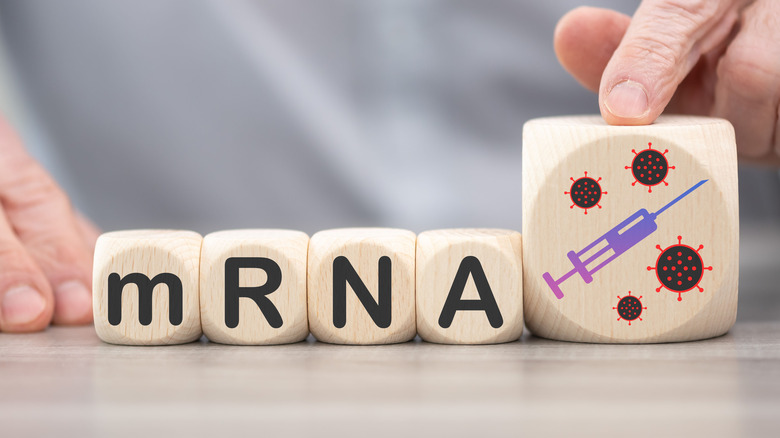How mRNA Vaccines Could Potentially Change The Course Of Treatment For Cancer
Cancer is a diagnosis nobody wants to get. Some forms are more aggressive than others, but no form is the ideal outcome to a doctor's visit. Both the diseases and the treatments can wreak havoc on a person's health and their life. And while there is an ongoing search for cures to many cancers, developments seem slow in coming. Which is why BioNTech's recent announcement about their mRNA vaccine is causing such a stir.
The company is best known for spearheading the search for a COVID-19 vaccine and making it possible for Pfizer to release one of the first vaccines earlier this year. But as NewScientist reports, protecting people from serious COVID-19 infections isn't the only thing the company is using mRNA vaccines for. It turns out that mRNA (also known as messenger RNA) can be engineered to trigger a mouse's immune response to cancer. Clinical trials found that, in mice with skin or lung disease, an mRNA treatment caused cancer tumors to shrink. This trial was so compelling that the treatment was given the go-ahead to move into human trials, paving the way for a new cancer treatment that can help the patient's body fight back without as many side effects as current treatments.
Of mice and humans
The Independent reports that, while this might be breaking news to many people, the clinical trial actually concluded in 2019 after 17 of 20 mice had smaller tumors in 40 days or less after their mRNA treatment. The study has since moved into phase I and then phase II of human trials. Each phase has its own focus, as explained by the American Cancer Society. Phase I is the step during which researchers determine the highest safe dose that a person can take without adverse side effects. Once that limit is found, the trial moves to phase II where researchers determine if it is effective as a treatment. In this case the disease in question is cancer in a variety of forms, and the trial is ongoing.
mRNA's potential is exciting news for cancer researchers and their patients alike, but Penn Medicine has a word of caution. Like the current cancer treatment known as CAR T cell therapy, mRNA treatments will have to be tailored to each patient individually. This is because mRNA treatments trigger the production of a protein targeted to the neoantigens of a patient's tumor and those are unique to each person. Neoantigens, as explained by the National Cancer Institute, are proteins that form on a cancer cell when a tumor's DNA mutates. But so long as researchers can nail down a process to tailor the treatment, new cancer relief may be on the horizon.

